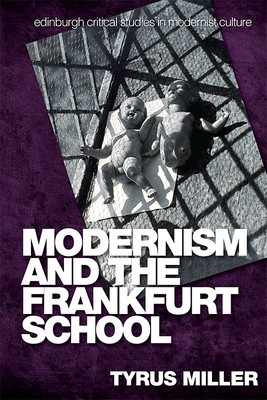
- We will send in 10–14 business days.
- Author: Tyrus Miller
- Publisher: Edinburgh University Press
- ISBN-10: 1474473210
- ISBN-13: 9781474473217
- Format: 15.5 x 23.1 x 1.3 cm, softcover
- Language: English
- SAVE -10% with code: EXTRA
Reviews
Description
Provides a single-volume introduction to the important connection of Frankfurt School thought and modernist culture
Tyrus Miller's book offers readers a focused introduction to the Frankfurt School's important attempts to relate the social, political, and philosophical conditions of modernity to innovations in twentieth-century art, literature, and culture. The book pursues this interaction of modernity and modernist aesthetics in a two-sided, dialectical approach. Not only, Miller suggests, can the Frankfurt School's penetrating critical analyses of the phenomena of modernity help us develop more nuanced, historically informed and contextually sensitive analyses of modernist culture; but also, modernist culture provides a field of problems, examples, and practices that intimately affected the formation of the Frankfurt School's theoretical ideas.
The individual chapters, which include detailed discussions of Walter Benjamin, Theodor Adorno, Herbert Marcuse as well as a survey of later Frankfurt School influenced thinkers, discuss the ideas of a given figure with an emphasis on particular artistic media or contexts: Benjamin with lyric poetry and architecture as urban art forms; Adorno with music; Marcuse with the liberationist art performances and happenings of the 1960s.
Key Features:
- Introduces well-studied major figures such as Benjamin and Adorno in a new light, while connecting their ideas with problems in modernist art and culture
- Offers a clear, thorough, and relevant survey of major ideas and figures
- Provides a revisionary view of the rigorous connection of Frankfurt School theory and modernist culture
EXTRA 10 % discount with code: EXTRA
The promotion ends in 17d.15:11:11
The discount code is valid when purchasing from 10 €. Discounts do not stack.
- Author: Tyrus Miller
- Publisher: Edinburgh University Press
- ISBN-10: 1474473210
- ISBN-13: 9781474473217
- Format: 15.5 x 23.1 x 1.3 cm, softcover
- Language: English English
Provides a single-volume introduction to the important connection of Frankfurt School thought and modernist culture
Tyrus Miller's book offers readers a focused introduction to the Frankfurt School's important attempts to relate the social, political, and philosophical conditions of modernity to innovations in twentieth-century art, literature, and culture. The book pursues this interaction of modernity and modernist aesthetics in a two-sided, dialectical approach. Not only, Miller suggests, can the Frankfurt School's penetrating critical analyses of the phenomena of modernity help us develop more nuanced, historically informed and contextually sensitive analyses of modernist culture; but also, modernist culture provides a field of problems, examples, and practices that intimately affected the formation of the Frankfurt School's theoretical ideas.
The individual chapters, which include detailed discussions of Walter Benjamin, Theodor Adorno, Herbert Marcuse as well as a survey of later Frankfurt School influenced thinkers, discuss the ideas of a given figure with an emphasis on particular artistic media or contexts: Benjamin with lyric poetry and architecture as urban art forms; Adorno with music; Marcuse with the liberationist art performances and happenings of the 1960s.
Key Features:
- Introduces well-studied major figures such as Benjamin and Adorno in a new light, while connecting their ideas with problems in modernist art and culture
- Offers a clear, thorough, and relevant survey of major ideas and figures
- Provides a revisionary view of the rigorous connection of Frankfurt School theory and modernist culture


Reviews